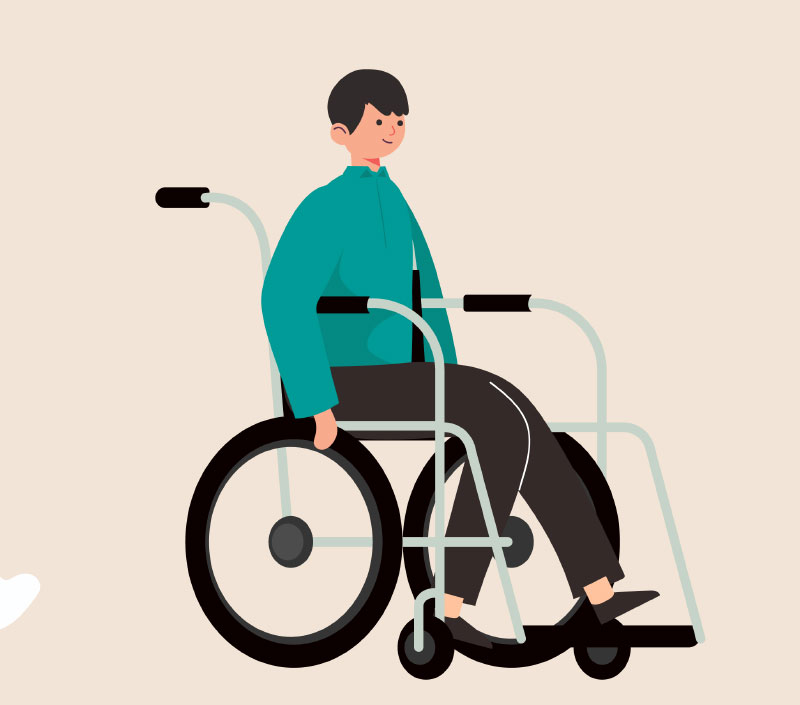Multiple Sclerosis Treatment in Mumbai
Multiple Sclerosis
Multiple sclerosis (MS) is a challenging and frustrating condition with unexpected symptoms of varied severity. Patients of this illness may have symptoms ranging from fatigue and numbness to paralysis, eyesight loss, and decreased brain function. According to the National MS Society, the illness affects women twice as frequently as males and affects an estimated 2.3 million individuals globally.
Multiple sclerosis disrupts communication inside the brain and between the brain and the body. Damage to the myelin sheath, a protective coating that covers nerve cells, causes it. Multiple sclerosis is a persistent, unpredictable, and often severe illness involving the central nervous system, spinal cord, and optic nerves. It is classified as an autoimmune illness since the immune system attacks and harms the neurological system.
Types of Multiple Sclerosis
The following are the different forms of multiple sclerosis:
- The initial episode of the clinically isolated syndrome, or CIS, lasts for 24 hours or longer. If the same symptoms occur again, the condition is known as relapse remitting multiple sclerosis.
- With an 85 percent frequency, relapse remitting multiple sclerosis (RMMS) is the most frequent kind of multiple sclerosis. The episodes are repeated, with short periods in between when the symptoms may improve or disappear altogether.
- Primary progressive multiple sclerosis, or PPMS, is characterised by symptoms that worsen with time and without remission. This accounts for 15% of all multiple sclerosis cases.
- Secondary progressive multiple sclerosis (SPMS), in which the patient has remissions followed by exacerbation of symptoms that advance slowly.
- Fulminant multiple sclerosis is a rare but exceedingly severe and quickly developing form of multiple sclerosis.
Potential Complications
These are some of the conditions that you may develop if you already have Multiple Sclerosis.- Paralysis of legs
- Extreme muscle spasms
- Observable mood swings
- Suffering with depression
Multiple Sclerosis Signs and Symptoms
The signs and symptoms of multiple sclerosis differ from person to person, depending on the extent of nerve damage as well as the nerves that have been affected. While some individuals may suffer moderate symptoms that are readily treated, others may experience severe symptoms that need extensive medical intervention. The following are the most common symptoms of multiple sclerosis:- Numbness or weakness in the extremities.
- Tingling feeling in one or both limbs
- Tremors
- Dizziness and vertigo are caused by a lack of coordination.
- Unsteady gait and mobility changes
- Spasticity and muscle spasms are caused by muscle weakness.
- When the patient tries to move his or her neck, he or she experiences Lhermitte’s sign or an electric shock-like sensation.
- Incontinence of the bladder and bowel
- Tiredness and general body weakness
- Vision issues such as partial blindness or distortion.
- Depression is caused by a psychological impact.
- Learning and remembering difficulties
- Neuropathic pain
Factors that Increase Your Risk of Developing Multiple Sclerosis
Although the specific causes of multiple sclerosis are unknown, there are several variables that may raise the risk of the disease. These are some examples:- Age, since the condition is more prevalent in those aged 20 to 40.
- Genetic factors
- Smoking excessively
- Infections that may lead to the transmission of viruses such as Epstein-Barr virus (EBV) or mononucleosis.
- Vitamin D and vitamin B12 deficiency in your body
Diagnostic test for Multiple sclerosis
- Blood tests are used to evaluate the prevalence of any other illness and to rule it out.
- A spinal tap, also known as a lumbar puncture, is a procedure that involves collecting a small sample of cerebrospinal fluid from the patient’s spine for a thorough investigation.
- Magnetic resonance imaging (MRI) is used to identify lesions in the brain and spinal cord. To emphasize the lesions, the patient is given an intravenous injection of contrast material.
- Evoked potential tests are used to capture the electrical signals that the nervous system generates in response to stimuli. Visual or electrical stimuli may be used in the test. The patient is instructed to watch a moving visual pattern or is treated to brief electrical shocks. Electrodes aid in calculating the amount of time it takes for information to travel down your neural pathways.
Treatments to deal with MS attacks:
- Corticosteroids are used to treat nerve irritation.
- To treat severe symptoms, plasmapheresis or plasma exchange is used.
Treatments to delay the progression include:
- DMT (disease-modifying treatment) is used to reduce the course of the illness.
- Injectables such as Interferon-beta medicine, which reduces the incidence of relapses, and Glatiramer acetate, which prevents the immune system from attacking the myelin sheath.
- To treat the symptoms and decrease the progression of the condition, oral drugs such as Fingolimod, Dimethyl fumarate, Teriflunomide, Siponimod, and Cladribine are used.
- Infusion therapies include the administration of medications such as ocrelizumab, natalizumab, and alemtuzumab.
- Physical therapy is used to help people overcome difficulties.
- Relapses of this condition may worsen, become more unexpected, and present with a variety of symptoms as they occur more often. Detecting this condition at an early stage will only help to slow the progression of MS. Although a cure has yet to be discovered, numerous medications that are now available may help reduce the disease’s progression. The best way to combat this condition is to see a doctor right once and be diagnosed.
For more information & consultation on Multiple Sclerosis treatment, Call our expert Dr. Amit Shah – Consultant Neurologist in Mumbai on 9819561456 or Book an Appointment

